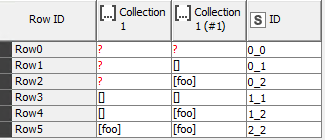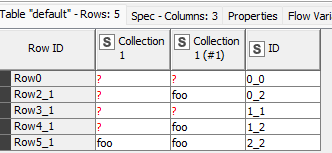I have just encountered some very strange behaviour with the Ungroup node when there are multiple columns being ungrouped and some contain missing and / or empty collections.
Consider:

(Which contains all combinations of ?, [] and a single-membered list [Foo] (for simplicity))
Ungrouping on only Collection 1 works as expected - i.e. if neither Skip missing or Skip empty collections options is checked, then all input rows are represented in the output table, rows with ID starting 0_ are all lost if we select Skip missing, rows with ID starting 1_ are lost if we select Skip Empty collections, and only row with ID = 2_2 makes it through if we select both options.
However…
If we ungroup on both columns, then we should still expect all input rows to be represented in the output table with neither ‘Skip…’ option selected…, but:

We’ve lost ID = 0_1, which had on each of ? and []… Not nice, and not what I was expecting!
If we select either Skip Missing or Skip Empty Collections options, then we lose the expected ID rows (0_0 or 1_1 respectively - both these have only the skipped type, ? or [] in both columns) AND we also lose the “rogue” ID = 0_1 row in both cases, which has one of each filtered value - not really expected, because I would expect it to be retained because it is not excluded rather than the other way round, but… open to interpretation… maybe…!
Now the final case - select both Skip Missing and Skip Empty Collections, and now we get really unexpected again…

Now the output contains only the rows with neither value present in either column - i.e. we have lost data from those rows with (? or []) and [Foo] -that’s really not expected to my mind?!
Example workflow which may explain better at
Thanks!
Steve